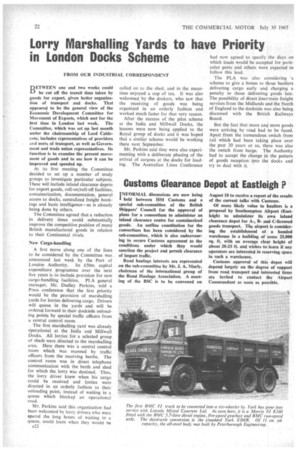Lorry Marshalling Yards to have Priority in London Docks Scheme
Page 24

If you've noticed an error in this article please click here to report it so we can fix it.
FROM OUR INDUSTRIAL CORRESPONDENT
BETWEEN one and two weeks could I-, be cut off the transit time taken by goods for export, given better organization of transport and docks. That appeared to be the general view of the Economic Development Committee for Movement of Exports, which met for the first time in London last week. The Committee, which was set up last month under the chairmanship of Lord Caldecote, includes representatives of providers and users of transport, as well as Government and trade union representatives. Its function is to examine the present movement of goods and to see how it can he improved and speeded up.
At its first meeting the Committee decided to set up a number of study groups to investigate particular subjects. These will include inland clearance depots for export goods, roll-on/roll-off facilities, containerization, documentation, general access to docks, centralized freight bookings and basic intelligence—as is already being done by others.
The Committee agreed that a reduction in delivery times could substantially improve the competitive position of many British manufactured goods in relation to their Continental rivals.
New Cargo-handling A first move along one of the lines to be considered by the Committee was announced last week by the Port of London Authority. Its £50m. capital expenditure programme over the next five years is to include provision for new cargo-handling facilities. PLA general manager, Mr. Dudley Perkins, told a Press conference that the first priority would be the provision of marshalling yards for lorries delivering cargo. Drivers will queue in the yards and will be ordered forward to their dockside unloading points by special traffic officers from a central control room.
The first marshalling yard was already operational at the India and Millwall Docks. All lorries for a selected group of sheds were directed to the marshalling area. Here there was a central control room which was manned by traffic officers from the receiving berths. The control room was in direct telephone communication with the berth and shed for which the lorry was destined. Thus, the lorry driver knew when his cargo could be received and lorries were directed in an orderly fashion to their unloading point, instead of waiting in a queue which blocked an operational road.
Mr. Perkins said this organization had been welcomed by lorry drivers who were spared the long hours of waiting in a queue, could learn when they would be A22 called on to the shed, and in the meantime enjoyed a cup of tea. It was also welcomed by the dockers, who saw that the receiving of goods was being organized in an orderly fashion and worked much faster for that very reason.
After the success of the pilot scheme at the India and Millwall Docks, the lessons were now being applied to the Royal group of docks and it was hoped that a similar scheme would be working there next September.
Mr. Perkins said they were also experimenting with a deliberate phasing of the arrival of cargoes at the docks for loading. The Australian Lines Conference had now agreed to specify the days on which loads would be accepted for particular ports and others were expected to follow this lead.
The PLA was also considering 3 scheme to give a bonus to those hauliers delivering cargo early and charging a penalty to those delivering goods late. The possibility of direct liner-train freight services from the Midlands and the North of England to the dockside was also being discussed with the British Railways Board.
But the fact that more and more goods were arriving by road had to be faced. Apart from the tremendous switch from rail which had been taking place over the past 20 years or so, there was also the switch from barge. The Authority had to accept the change in the pattern of goods reception into the docks and try to deal with it.












































































































